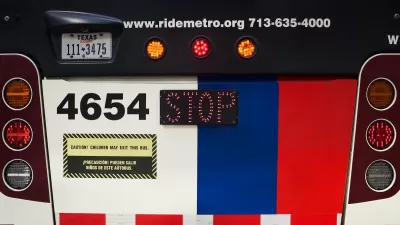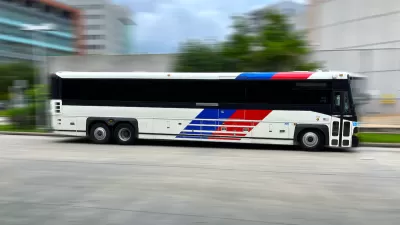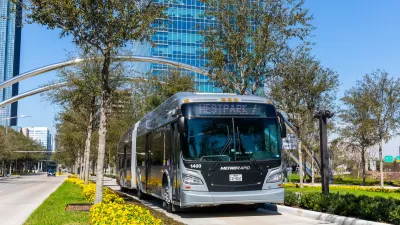When Houston reworked their bus system they emphasized frequency and simplicity. The results have been a bump in ridership, though some complain the system sacrificed coverage and equity to make those gains.

In September of 2015, the Houston METRO bus system reworked their service. A year later, the change is evident. "That massive overhaul decreased the amount of wait times between buses and simplified route geography so maps were easier to understand and read," Bandon Formby reports in the Texas Star Tribune. This change in service gave rise to a 3% increase in ridership. That number may seem modest but becomes more impressive when compared to the many bus systems that are losing ridership around the country.
Still, this emphasis on more regular service comes at a cost. Formby talked to some commuters who were now further from stops. "Tindle said her old route into work downtown stopped near her home. After the overhaul, the closest stop is now half a mile away. And it isn’t covered." These concerns have also been raised in city government. "After presenting its initial plans for its bus overhaul to the public, Houston METRO’s board agreed to increase the budget for local routes by 4 percent, or about $12 million, amid criticism that poor residents in the city’s northeast quadrant were losing too much service," Formby writes.
This overhaul gets at an important if not "sexy" aspect of successful public transportation. While wild ideas grab headlines, practical concerns about regular service are harder to make newsworthy and, consequently, can be the target of cuts.
FULL STORY: Texas transit agencies eye bus changes after ridership jump in Houston

Planetizen Federal Action Tracker
A weekly monitor of how Trump’s orders and actions are impacting planners and planning in America.

Map: Where Senate Republicans Want to Sell Your Public Lands
For public land advocates, the Senate Republicans’ proposal to sell millions of acres of public land in the West is “the biggest fight of their careers.”

Restaurant Patios Were a Pandemic Win — Why Were They so Hard to Keep?
Social distancing requirements and changes in travel patterns prompted cities to pilot new uses for street and sidewalk space. Then it got complicated.

Platform Pilsner: Vancouver Transit Agency Releases... a Beer?
TransLink will receive a portion of every sale of the four-pack.

Toronto Weighs Cheaper Transit, Parking Hikes for Major Events
Special event rates would take effect during large festivals, sports games and concerts to ‘discourage driving, manage congestion and free up space for transit.”

Berlin to Consider Car-Free Zone Larger Than Manhattan
The area bound by the 22-mile Ringbahn would still allow 12 uses of a private automobile per year per person, and several other exemptions.
Urban Design for Planners 1: Software Tools
This six-course series explores essential urban design concepts using open source software and equips planners with the tools they need to participate fully in the urban design process.
Planning for Universal Design
Learn the tools for implementing Universal Design in planning regulations.
Heyer Gruel & Associates PA
JM Goldson LLC
Custer County Colorado
City of Camden Redevelopment Agency
City of Astoria
Transportation Research & Education Center (TREC) at Portland State University
Camden Redevelopment Agency
City of Claremont
Municipality of Princeton (NJ)





























